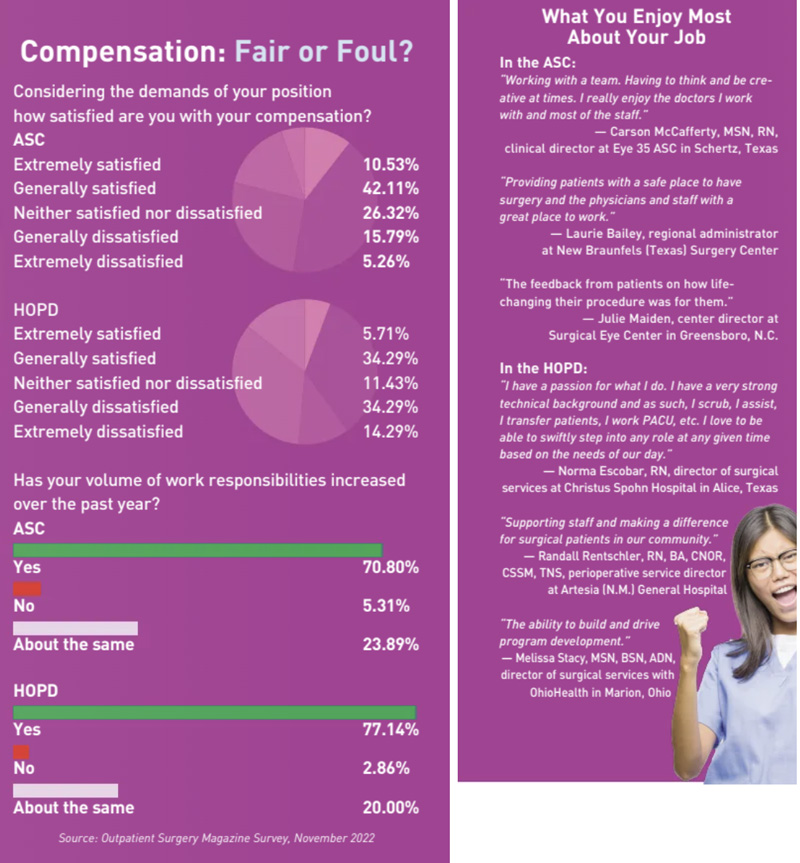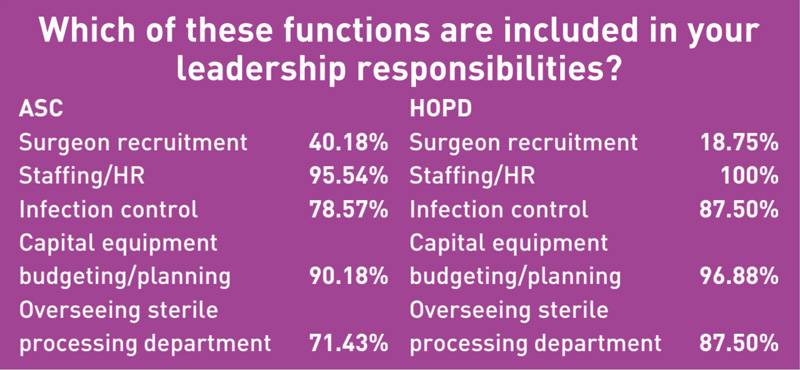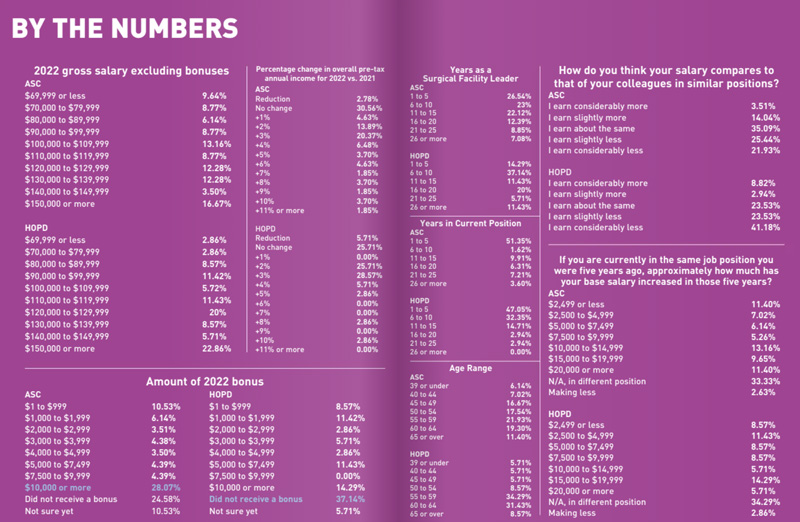Confront Difficult Conversations Head On
Transitioning from a perioperative nurse to a leadership role in an Ambulatory Surgery Center (ASC) presented me with numerous challenges, but none were as daunting...
This website uses cookies. to enhance your browsing experience, serve personalized ads or content, and analyze our traffic. By clicking “Accept & Close”, you consent to our use of cookies. Read our Privacy Policy to learn more.
By: Joe Paone | Senior Editor
Published: 2/2/2023
Leaders of outpatient surgery centers are forever asked to do more with less, but 2022 was an extreme version of that dynamic for many. As the COVID-19 pandemic continued its excruciating journey to becoming an endemic (are we there yet?), the economics of running a surgical facility became even more difficult last year as the dual whammy of inflation and an unprecedented nurse staffing crisis threw some centers’ finances and scheduling into relative chaos.
Through it all, surgery center administrators have fought the good fight — encouraging their beleaguered staffs, ensuring that patient safety and infection control remained top priority, tracking down supplies that were sometimes difficult to procure, keeping service lines moving, and reacting with aplomb to other unanticipated challenges as they arose.
Given all of that, were surgical facility leaders properly compensated for all they did throughout a year unlike any other? It depends on who you ask. We did in our annual Salary and Workforce Survey. What we found was not just about what administrators and directors of nursing were paid, but also a range of opinions about whether they felt it was enough. We also took leaders’ temperatures on how they’re feeling about their jobs, the staffing crisis and more.
As we head into 2023, everyone is hoping that conditions in the marketplace stabilize —but few are willing to count on it.
We asked whether your compensation aligns with your management and financial responsibilities — if you feel you’re paid enough for all you do. Some feel their compensation package needs a reset.
“I feel that a reevaluation of my duties versus pay should be done,” says Carson McCafferty, MSN, RN, clinical director at Eye 35 ASC in Schertz, Texas. “I have taken on more responsibilities and have not had an increase in compensation to show that. Overall, I am still happy, but I do think I am deserving of higher compensation.”
“I feel that my compensation is a bit lower than it should be, in consideration of the responsibilities,” says Linda Nelson, MSN, RN-BC, CASC, administrator at North Pinellas Surgery Center in Dunedin, Fla. “In the healthcare industry, companies find it acceptable to pay managers and directors less money than what would be paid in another industry for the same amount and degree of responsibilities. We are responsible for fiscal oversight in addition to the health and safety of patients and staff.”
“I am thankful,” says Laurie Bailey, regional administrator at New Braunfels (Texas) Surgery Center, who also oversees surgery centers in Austin and Conroe. “However, the responsibility of overseeing three ASCs isn’t [commensurate with my] salary. Also, my bonus is less than 10% of my annual.”
Norma Bacon, administrator at New England Surgery Center in Beverly, Mass., believes she isn’t paid enough because she also handles accounts payable and receivable as well as human resources. Susie Weiesnbach, RN, center director at Eye Surgery Center of Tulsa (Okla.), agrees that her compensation does not match her workload. “Our responsibilities multiply annually,” she says.
HOPD leaders echoed the same thoughts of these ASC leaders. “Being on salary, you tend to do what is asked of you, [but] then it turns into hundreds of hours worked above your salary without compensation,” says Josephine Moreno, RN, BHA, director of surgical services at Pacifica Hospital of the Valley in Sun Valley, Calif.
“I cover several units in my hospital and feel I should be compensated at a greater rate,” says Sheila Capasso, MSN, RN, ANNCN-AG, CAPA, director of surgical services at The Miriam Hospital in Providence, R.I.
Melissa Stacy, MSN, BSN, ADN, director of surgical services with OhioHealth in Marion, Ohio, says her compensation doesn’t account for her dealing with multiple sites, and the travel along with the different bosses and staff that come with it. “I’m not being paid differently than those with one site,” she says.

Other leaders are more sanguine about their situations. “As a manager, I have never been that concerned about my compensation as long as I can pay my bills and enjoy the activities I like to do without living paycheck to paycheck,” says Denise Latimer-Wright, AAS, RN, CNOR, clinical director at Lakeview Surgery Center in Bowie, Md. “I do feel I am compensated enough for what I do, but I will always welcome an increase in salary and/or bonuses.”
“I believe the pay is in line with the multitude of responsibilities and the serious nature of what we do on a day-to-day basis — quality, safety, patient and associate satisfaction among a few areas of importance,” says Norma Escobar, RN, director of surgical services at Christus Spohn Hospital in Alice, Texas.
Diane Youd, RN, BSN, MBA, CNOR, administrator and director of nursing at Waterbury (Conn.) Surgery Center, says her dual roles can be all-consuming. “I do feel I am compensated [well], but the workload at times can be extremely demanding and difficult to manage and balance,” she says.
“I think I am paid well for what I do, but I do a lot, perhaps by choice, as it relates to ‘hire someone and find enough for them to do, or do it myself,’” says Barb Draves, LPN, CASC, administrator at The Surgery Center in Middleburg Heights, Ohio. “I love what I do, and I am focused at this time on our ‘next generation.’ I’ve been doing this for almost 40 years and while I do love it, I am getting too old to work this hard!” she jokes.
Recruitment and retention of staff is an ongoing, intensifying problem for many outpatient surgery administrators. We took the temperature of the situation at individual facilities in our survey and asked about the steps administrators have taken to maintain full, capable, productive staffs.
Many ASCs find themselves competing with much larger and better-financed health systems for clinical talent.
“It has been difficult to recruit quality, committed nurses over the past year, especially OR nurses,” says Denise Latimer-Wright,
AAS, RN, CNOR, clinical director at Lakeview Surgery Center in Bowie, Md. “We cannot compete with what agencies and hospitals offer.” She says, however, that her facility continues to attract nurses looking for work/life balance in a relatively
non-stressful environment.

Scott Berger, RN, administrator at Pleasant View Surgery Center in Post Falls, Idaho, agrees that recruitment of qualified candidates has been difficult. “The inability to find OR circulating nurses has forced us to hire and train a nurse interested in the OR, but without any previous OR experience,” he says, adding that training on the job can be a gamble for a small ASC. “It could be weeks or months before determining if a trainee will fly solo or wash out,” he says. Mr. Berger says his center puts a great deal of effort into retaining current employees through increased pay, medical benefits and PTO.
Susie Weiesnbach, RN, center director at Eye Surgery Center of Tulsa (Okla.), tells a similar tale. “I have been able to retain employees,” she says. “But we are growing and need additional staff. It is difficult to recruit, especially experienced personnel.”
“This has been an uphill battle since COVID,” says Cherokee Gonzalez, BSN, RN, regional director at Florida Medical Clinic Ambulatory Surgery Centers in Tampa. “The lure of Monday through Friday with no weekends or call is no longer
as powerful as it used to be. People need more income and less expensive benefits, which is hard for an ASC to provide — not to mention that our hospital competitors are starting to offer work/life-balanced schedules they never did before.”
“Salaries are definitely much higher than in years past as the hospitals are offering more and sign-on bonuses for staff,” says Kim Chadwick Hamma, RN, administrator at Little Rock (Ark.) Surgery Center.
Some ASCs are responding to the recruitment and retention issue by tweaking compensation and offering additional perks. For example, Waterbury (Conn.) Surgery Center, which is struggling to fill full-time perioperative nurse positions, upped its compensation ante by offering a $10,000 sign-on bonus in the hopes of better attracting talent.
“We have a great team of RNs that we pay an average of 20% more than other ASCs in the area,” says Dianna Reed, BA, administrator at Sani Eye Surgery Center in Templeton, Calif. “Our RNs are here long-term as per diem employees because of the benefits we give them.” New England Surgery Center in Beverly, Mass., changed its pay scale to be based on number of years as a nurse to address disparities, says Administrator Norma Bacon.

However, other ASC administrators report relatively smooth sailing, particularly in terms of retention — largely thanks to positive workplace cultures and experiences, as well as by providing additional compensation and benefits.
“Our ability to recruit staff is relatively good,” says Linda Nelson, MSN, RN-BC, CASC, administrator at North Pinellas Surgery Center in Dunedin, Fla. “Due to our center having a good reputation in the community, word of mouth and the use of online job platforms has kept us at adequate staffing levels. We have utilized more flexible schedules — several of our nurses work 32 hours/four days — which has helped with work/life balance, which aids in retention.”
“We have had the same staff for more than 10 years,” says Maria E. Pescasio, BS, administrator at Chugay Cosmetic Surgery in Long Beach, Calif. “We have a team that works and has been treated as a family.” That family vibe includes profit-sharing along with bonuses.
“We have great people and a really good generational mix at this time,” says Barb Draves, LPN, CASC, administrator at The Surgery Center in Middleburg Heights, Ohio. “Maternity leaves on the young ones and joint replacements on the older ones always create havoc for scheduling, but they all know that it all balances out in the end.”
“We have a very low turnover and are able to capture staff when needed,” says Carson McCafferty, MSN, RN, clinical director at Eye 35 ASC in Schertz, Texas. “We have remained adequately staffed,” echoes Ashlee Daniel, RN, nurse administrator at Southern Surgery Center in Albany, Ga. Shane Ricks, RN, BSN, MHS, administrator at Millennium Surgery Center in Meridian, Idaho, has been able to keep his staff intact throughout the pandemic. “We have not had any significant issues due to staffing for the past two years,” he says. “I believe it is due to our excellent work culture.” Stephen Gatesman, RN, clinical director/administrator at Executive Park Surgery Center in Fort Smith, Ark., shares a similar report. “We have been able to retain staff by maintaining a positive workplace culture.”
“We are currently fully staffed with per diems for coverage, and we gave across-the-board cost of living wages along with annual merit-based raises for all staff,” says Andrea Sanders, RN, BSN, administrator/clinical director at Syracuse (N.Y.) Surgery Center. “We have really nurtured a culture that is based in understanding, kindness and comradery within the staff.”

Laurie Bailey, regional administrator at New Braunfels (Texas) Surgery Center, also oversees two other facilities. “We have excellent staffing and retention at my main location because of employee satisfaction and culture, [but] staff availability is difficult at the two other locations,” she says. “Few RNs are specialty-trained for operating room or PACU. Salary requirements are also about 10% higher than two years ago.”
Other ASCs are maximizing staff on hand by training them to perform additional tasks. “Many of our staff members have been here since the beginning,” Tammy Stanfield, BSN, RN, CCRN, administrator/director of nursing at North Pines Surgery Center in Conroe, Texas.
“I cross-train whoever I can so they keep learning and don’t get bored in their current roles,” says Cindy Novak, RN, BS, administrator at San Luis Obispo (Calif.) Surgery Center. “I strive to be transparent and accountable and expect the same of them.”
What bugs our survey respondents most about their jobs? Here’s a breakdown of some of the frustrations they expressed.
On the HOPD side of the aisle, recruitment and retention issues are somewhat different, as these facilities are connected to major health systems that are trying to balance a number of much larger financial and operational issues.
“It is very difficult to bring in new staff as administration doesn’t want to pay the community standard wages,” says Josephine Moreno, RN, BHA, director of surgical services at Pacifica Hospital of the Valley in Sun Valley, Calif.
At Artesia (N.M.) General Hospital, Perioperative Services Director Randall Rentschler, RN, BA, CNOR, CSSM, TNS, has been struggling to recruit OR nurses. “We’ve had positions open for more than six months, and currently have offered a travel position,” he says. Sheila Capasso, MSN, RN, ANNCN-AG, CAPA, director of surgical services at The Miriam Hospital in Providence, R.I., says her facility has been able to recruit well, but retention has been an issue.
Other HOPD respondents report less stressful staffing situations. “We have done a great job fixing the culture and growing our team, even in the face of the pandemic,” says Melissa Stacy, MSN, BSN, ADN, director of surgical services with OhioHealth in Marion, Ohio. “We are fully staffed with the exception of an entry-level manager who was promoted due to succession planning.”
“Most of the staff is rooted in our community,” says Norma Escobar, RN, director of surgical services at Christus Spohn Hospital in Alice, Texas. “We have very little turnover and when we do it is for relocation reasons. Almost half of the staff including surgeons have worked together for over 30 years. Love my team!” OSM
Transitioning from a perioperative nurse to a leadership role in an Ambulatory Surgery Center (ASC) presented me with numerous challenges, but none were as daunting...
Welcome to A Day in the Life of an Administrator, our online column, where we sat down with Cynthia Wiersema, director of nursing at NANI Vascular in Fort Wayne, Ind...
Each of your staff members has a unique personality....